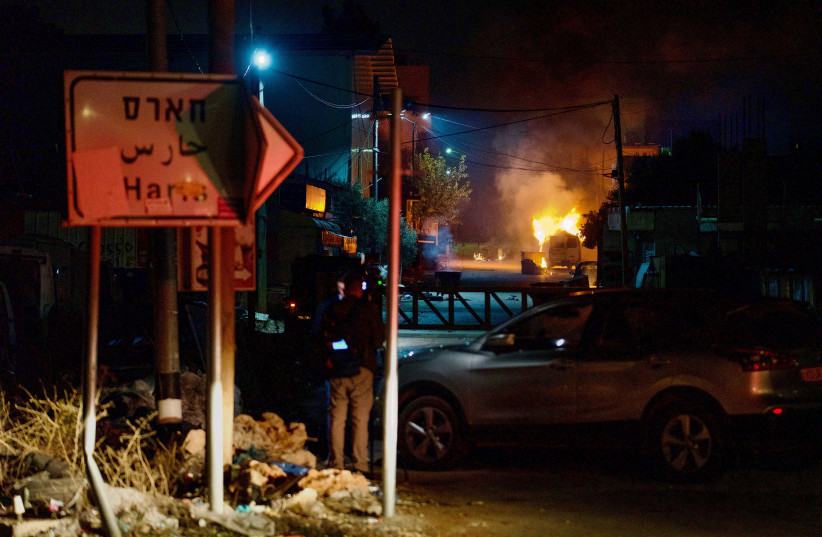As Israel awaits a new government, the narrative about the likely “rise” in tensions with the Palestinians is already being printed.
The incoming government will be more right-wing than previous governments and it is expected that any renewed clashes in the West Bank will be blamed on Jerusalem.
However, the larger context is that this year has been one of the most violent years in recent memory.
Overall, there has been an increase in clashes with Palestinian terror groups, specifically Islamic Jihad and the Lions’ Den. There have been near-daily clashes during raids. Many of them have resulted in casualties, primarily among Palestinians.
While critics usually blame Israel, or portray the Palestinians as solely civilians and not as performing terrorist acts, the overall story is more complex.

The government in power since May 2021 led by Naftali Bennett and Yair Lapid was a left-leaning government, ostensibly the kind that would be most likely to reduce tensions.
However, the almost-daily clashes in the West Bank point to a larger problem, whose address is not in Jerusalem.
So why are tensions up?
What is actually going on is that the Palestinian Authority appears to be weakening and aging. Its lack of control in Jenin and Nablus is enabling gunmen to enter the power vacuum.
Israel is forced to do more to prevent the illegal smuggling of weapons and to try to neutralize terror activity before it spreads into sovereign Israel.
This attempt is not entirely successful; there have been attacks, and many of them don’t leave a clear trail of who is responsible.
Israel now faces not only the prospect of increasing violence, but also the inevitable feedback loop of confirmation bias where the incoming government will be accused of escalating tensions, and there are many who have an interest in this narrative.
Israel’s enemies, such as Iran, have a vested interest in exploiting the situation. The flood of weapons into the West Bank, including many M-16s, illustrates this, especially with the rise and might of Islamic Jihad.
Israel is always at fault, it seems
ANOTHER PROBLEM is the tendency to blame Israel for every casualty of clashes in the West Bank. Over the weekend, videos emerged of a Palestinian man stabbing a soldier, but the incident was falsely portrayed as Israeli forces killing a Palestinian without provocation.
Israel is in a difficult position when there is footage of the incident, even of it showing the Palestinian man reaching for the soldier’s weapon, yet it is still described as a “scuffle” or “execution” in foreign coverage and by international actors. These kinds of incidents may become even more one-sided in coming months.
Regardless of whether Israel is in the right or wrong, Israel faces a huge uphill battle to accurately portray the context of any given incident.
Last year, there was a rising chorus attempting to portray Israel as an “apartheid” state, including Amnesty International, Human Rights Watch and B’Tselem.
The overall narrative of these claims is that Israel controls the “whole area from the river to the sea,” a classic pro-Palestinian nationalist talking point, and that therefore its rule is “apartheid.”
This argument asserts that Israel controls the Gaza Strip, even though Israel pulled out of mainland Gaza in 2005; in the run-up to Israel’s elections, Jerusalem was even accused of not letting Gazans vote.
This is part of the building of the narrative of “one state,” to force Gaza to be part of Israel, forcing Israel to be charged with the lives of millions of Palestinians, regardless of whether people in Gaza or Tel Aviv want that. The narrative arc trying to portray Israel as responsible for Gaza may only grow.
Self-fulfilling prophecy
In a sense, the incoming government will be a self-fulfilling prophecy for some critics who have always portrayed Israel as an extreme right-wing state, out of step with their view of the international liberal world order.
This will certainly grant a possible opening for tensions in the West Bank to grow and for Israel to continue to struggle to portray its security responses as acceptable and correct.
At the same time, it will be forgotten that 2022 was actually a year of growing clashes in the West Bank, setting the stage for a possibly worse situation.
The Biden administration will also be pressured over the two years it has left in office to do something in regard to this potentially worsening conflict.
The administration has shied away from this, preferring to focus on Russia and China as well as other issues; even the Iran deal appears on the rocks.
However, US Secretary of State Antony Blinken, in his address to J Street this week, may bring a renewed angle to the focus on the Israel-Palestinian conflict.
